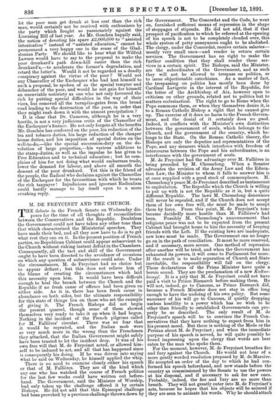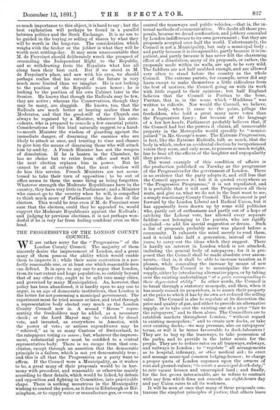M. DE FREYCINET AND THE CHURCH. T HE debate in the
French Senate on Wednesday dis- poses for the time of all thoughts of reconciliation between the Conservatives and the Republic. Doubtless the Government could not have taken any other tone than that which characterised the Ministerial speeches. They have made their bed, and all they now have to do is to get what rest they can on it. In the present position of French parties, no Republican Cabinet could appear subservient to the Church without risking instant defeat in the Chambers. Consequently, all the tact and skill of the Government -ought to have been directed to the avoidance of occasions on which any question of subservience could arise. Under the circumstances, M. de Freycinet had no choice but to appear defiant ; but this does not relieve him of the blame of creating the circumstances which laid this necessity upon him. It would have been difficult enough to heal the breach between the Church and the Republic if no fresh cause of offence had been given on either side. As it is, there has been fresh cause in abundance on both sides, but the ultimate responsibility for this state of things lies on those who set the example .of giving it. The French Bishops did not begin the present quarrel, though some of them showed themselves very ready to take it up when it had begun. Nothing in the incident of the French pilgrims called for M. Fallieres' circular. There was no fear that it would be repeated, and the Italian mob were so very much more in the wrong than the Frenchmen they attacked, that the Italian Government might safely have been trusted to let the incident drop. It was of his own free will that M. de Freycinet acted, or allowed him- self to be induced to act, and all that has happened since is consequently his doing. If he was driven into saying what he said on Wednesday, he himself applied the whip. There is no need to examine closely either his speech or that of M. Fallieres. They are of the kind which any one who has watched the course of French politics for the last few weeks could have written out before- hand. The Government, said the Minister of Worship, had only taken up the challenge offered it by certain Bishops. He did not add that this Episcopal challenge had been provoked by a previous challenge thrown down by the Government. The Concordat and the Code, he went on, furnished sufficient means of repression in the shape of stoppages of stipends. He did not add, that if that prospect of pacification to which he referred at the opening of his speech is not to be completely clouded over, this whole system of petty annoyances ought to be abolished. The clergy, under the Concordat, receive certain salaries— mostly very small ones—and render in return certain services. The Government has no right to make the further condition that they shall render these ser- vices in a certain spirit. The Bishops, said the Minister, are the subordinates of the Government, and as such they will not be allowed to trespass on politics, or to issue objectionable catechisms. As a matter of fact, the trespassing on politics has mostly been done by Cardinal Lavigerie in the interest of the Republic, for the letter of the Archbishop of Aix, however open to criticism on other grounds, related not to politics but to matters ecclesiastical. The right to go to Rome when the Pope summons them, or when they themselves desire it, is to a Roman Catholic Bishop a right that he cannot give up. The exercise of it does no harm to the French Govern- ment, and the denial of it certainly does no good. Indeed, it conflicts with the Minister's own distinction between the government of souls, which belongs to the Church, and the government of the country, which be- longs to the State. On the Roman Catholic theory, the Bishops are only the deputies and representatives of the Pope, and any measure which interferes with freedom of intercourse between the Pope and his subordinates, is an interference with the government of souls.
M. de Freycinet had the advantage over M. Fallieres in being preceded by M. Chesnelong. When a Senator advocates the revision of the Army Law and the Educa- tion Law, the Minister to whom it falls to answer him is at once supplied with a good stock of commonplaces. M. Chesnelong's peace M. de Freycinet described as tantamount to capitulation. The Republic which the Church is willing to put up with is not the Republic as it is, but a quite different Republic. The laws M. Chesnelong denounces will never be repealed, and if the Church does not accept them of her own free will, she must be made to accept them by force. From this point, M. de Freycinet's tone became decidedly more hostile than M. Fallieres's had been. Possibly M. Chesnelong's announcement that religious peace was not to be expected from the present Cabinet had brought home to him the necessity of keeping friends with the Left. If the existing laws are inadequate, new laws must be made. The Government can no longer go on in the path of conciliation. It must be more reserved, and if necessary, more severe. One method of repression after another will be tried, and when the Government has exhausted its powers, it will come to Parliament for more. If the result is to make separation of Church and State inevitable, the responsibility will fall on the clergy. These declarations of the Prime Minister have quite a heroic sound. They are the proclamation of a new Kultur- kampf. It is a pity that M. de Freycinet could not have paid. a visit to Prince Bismarck before making them. He will not, indeed, go to Canossa, as Prince Bismarck did, because a French Minister does not stay in office long enough to have the undoing of his own policy. But some successor of his will go to Canossa, if quietly dropping useless hostility to a power which has no wish to be other than friendly to established Governments can pro- perly be so described. The only result of M. de Freycinet's speech will be to convince the French Con- servatives that they have nothing to expect from him in his present mood. But there is nothing of the Mede or the Persian about M. de Freycinet; and when the immediate purpose of his speech is served, he will quite possibly be found impressing upon the clergy that words are best eaten by the man who spoke them. For the moment, however, M. de Freycinet breathes fire and fury against the Church. He would not hear of a more gently worded resolution proposed by M. de Marcere. He accepted an order of the day to which he had con- formed his speech beforehand, and now stands before the country as commissioned by the Senate to use the powers at his disposal, and if necessary to ask for new ones. Probably, indeed, the fire and fury are no more than breath. They will not greatly enter into M. de Freycinet's acts, because he hopes that his objects will be secured if they are seen to animate his words. Why he should attach so much importance to this object, it is hard to say ; but the best explanation will perhaps be found in a parallel between politics and the Stock Exchange. It is no use to be guided in the buying or selling of shares by what they will be worth in the long-run. The consideration which weighs with the broker or the jobber is what they will be worth next settling-day. It may seem unaccountable that M. de Freycinet should deliberately wreck the prospect of reconciling the Independent Right to the Republic, and so withdrawing from the Royalists what has all along been their best card. But if we stood in M. de Freycinet's place, and saw with his eyes, we should perhaps realise that his survey of the future is very much more limited than we imagine. He is not looking to the position of the Republic years hence ; he is looking to the position of his own Cabinet later in the Session. He knows that though the Radicals may be few, they are active ; whereas the Conservatives, though they may be many, are sluggish. He knows, too, that the Radicals are much better at bearing malice than the Moderates, and that the good-will of the Church can always be regained by a Minister, whatever his ante- cedents, who is prepared to concede a few essential points. Considerations of this kind naturally suggest to a hand- to-mouth Minister the wisdom of guarding against the immediate danger, of disarming the enemies who are likely to attack at once, and trusting to time and chance to give him the means of disarming those who will attack him by-and-by. A French Minister has not the weapon of dissolution. If he is beaten in the Chamber, he has no choice but to retire from office and wait till the next election replaces him in power. But he cannot be at all certain that the next election will do him this service. French Ministers are not accus- tomed to take their turn of opposition ; to be out of office seems to them the same thing as being forgotten. Whatever strength the Moderate Republicans have in the country, they have very little in Parliament ; and a Minister who cannot go to the country when he will, is compelled to think much more of Parliament than he does of the electors. This would be true even if M. de Freycinet were sure that the electors, could they be appealed to, would support the Moderate Republicans against the Radicals; and judging by previous elections, it is not perhaps won- derful if he is very far from feeling confident even on this head.











































 Previous page
Previous page